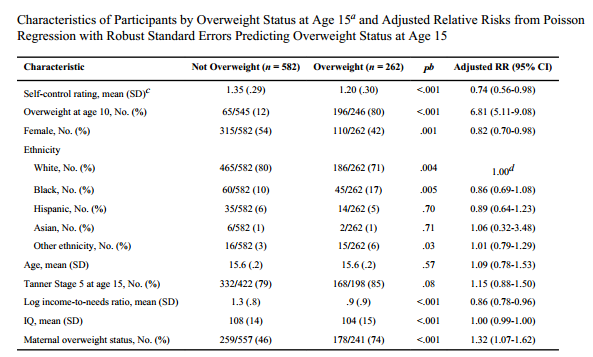“Children who were rated 1-point higher on a 3-point self-control scale were 26% less likely to be overweight as adolescents.”
Multiple factors determine a child's weight status, of whether they are healthy or overweight. This study assessed whether self-control was one of those factors.
844 children were watched from age 9 to 15. Those who were more self-controlled at age 9 were significantly less likely to be overweight at age 15.
Although it's not clear what kind of intervention could increase the self-control of 9 year olds, these results suggest that several interventions should be hypothesized and tested, given that self-control could help tame the obesity epidemic.
Click here to learn more about self-control.
Study Details
Hypothesis: Self-control at age 9 will predict weight status six years later.
Method: 844 children were surveyed at age 9, and then had their weight taken at age 10 and 15, as part of a longitudinal study.
Measures: A measure of self-control was compared against weight status.
A composite self-control measure was constructed through the responses of three informants – mother, father, and classroom teacher on the items related to self-control in the Social Skills Rating System (SSRS) questionnaire.
Children with BMI scores greater than the 85th percentile were classified as overweight. Weight was taken by nurses.
A number of other measures were included as controls.
Results: “Children who were rated as being more self-controlled at age 9 were less likely to be overweight at age 15, even when controlling for age, gender, ethnicity, pubertal development, IQ, log income-to-needs ratio, maternal overweight status, and overweight status at age 10. Children who were rated 1-point higher on a 3-point self-control scale were 26% less likely to be overweight as adolescents.”
Concerns: It's unclear to me why a percentile BMI classification was applied (85%+). Overweight people are overweight, even if they're in the 60% percentile. It's possible this classification scheme hides a weaker correlation between self-control and weight status (a true cut-off would likely be lower, including more people in the overweight group). The authors also mention the concern that as the demographics are not representative of the full U.S. population, they may not generalize to all population sub-groups.
Learn how to increase your happiness.
Tsukayama, E., Toomey, S. L., Faith, M., & Duckworth, A. L. (2010). Self-control as a protective factor against overweight status in the transition to adolescence. Archives of Pediatrics and Adolescent Medicine, 164(7), 631-635.

